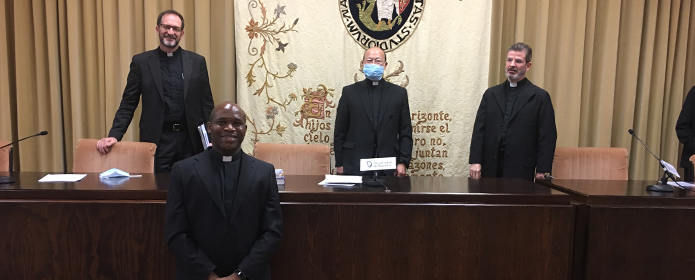A thesis on the ecumenical theology of Joseph Ratzinger, first to be defended in the Schools Ecclesiastical after the confinement by COVID19
In addition to Spanish, Nigerian Jerome Omoregie learned German during his stay at student to study the original texts of his research

Jerome Omoregie, Nigerian student of the School of Theology, is the author of the first doctoral thesis to be defended at the Schools Ecclesiastical after the confinement by COVID 19, and the second at the University of Navarra. It took place on May 21 at the classroom Magna of the Schools of Theology, which made it possible to maintain social distance during the defense.
The ecumenical theology of Joseph Ratzinger in the light of Unitatis Redintegratio is the degree scroll of his research, which was directed by Professor Pablo Blanco and advised by Professor Francisco Varo.
He says that the confinement has generated uncertainty because he did not know if he would be able to defend the thesis before June, as planned. However, this time has allowed him to polish certain parts of the work and to deepen some specific lines of the research, such as Pentecostal theology.
In his thesis he has captured the Pope Emeritus' position on how the Catholic Church's self-understanding guide its relationship with other churches and ecclesial communities. "Ratzinger affirms that Christian unity is possible and that it is a slow and painstaking process; and he emphasizes that true Christian unity is the action of the Trinity," he explains.
His research is written in English, although the defense was conducted at Spanish. In addition to these two languages, Jerome speaks two of the official dialects of Nigeria, some French and Italian, and German. He had to learn this language in order to be able to read the original texts with which his research worked.
Time to learnJerome, a native of Ikeja (Nigeria), is the eldest of five siblings. He came to the University thanks to the financial financial aid lent to him by the CARF Foundation to study the licentiate degree in Theology. It was 2015 and he had just completed his tenth anniversary as a priest.
"I had to understand that things were different here, the culture, the climate, the food... Over time I realized that people are not so different and I have made very good friends. It has been a time of learning a lot and studying."
When licentiate degree concluded, in 2017, it continued with the programs of study of doctorate. This time without financial aid economic. He feels very grateful for this opportunity, for all that he has learned and for all that his teachers and friends have helped him. And he wants to thank especially in these last years all the financial aid he has received from the staff of the Library Services to be able to get the materials he has needed in his research.
He is currently finishing the publication process of his thesis and when he finishes and the pandemic allows it, he will return to his country. "I still don't know what plans the bishop of my diocese has for me, and I am open to be wherever I am needed. But if I could choose, I would like to devote myself to pastoral work and to Education for young people. The training is core topic for a well-developed society."
